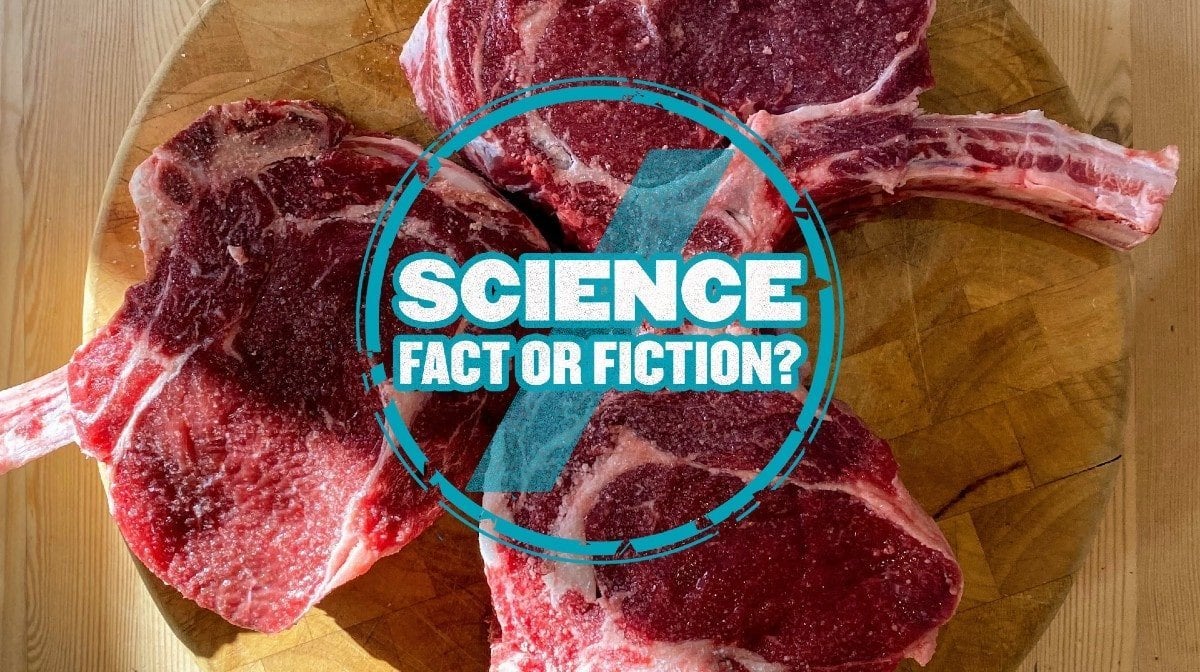
Welcome back to Science Fact or Fiction, the series where we debunk or approve the latest fitness trends from the most talked about diets to the latest trending TikTok workout. So, let's find out what our nutritionist Jenaed thinks about the meatiest diet yet...the carnivore diet.

What is the carnivore diet?
Certain elements of the Carnivore diet may lead to weight loss. There have been studies to show that a low-carb and high-protein diet can promote weight loss –

Carnivore diet disadvantages
Cuts out fiber
Eliminating plant-based foods means eliminating fiber. Fiber has many benefits including but not limited to:
- removing excess cholesterols and bile acids from your body
- regulating blood glucose and blood lipid levels
- supporting immune system health
- feeding the essential bacteria in your gut microbiome
Bye, bye carbs
Your body depends on carbs for energy. Your brain is mainly fueled by glucose and carbs give your muscles energy. To diet culture’s disbelief- carbohydrates are not bad. Refined carbs in fast food, sugary beverages, and chocolate bars are nothing like the carbs in whole grains, beans, fruit and veg. They’re broken down and digested completely differently. Plus – imagine never having a chocolate in your life again? No thank you.
No carbs = no veg
Pricey
Increases saturated fats

Carnivore diet foods
- red meat
- white meat
- offal (i.e., organ meat)
- animal fat (i.e., lard)
- poultry
- fish
- seafood
- eggs
- dairy (optional)
While meat is nutritious and provides micronutrients and its own set of benefits, it should not be the
Are there any benefits of the carnivore diet?
Meat can certainly play a role in a healthy eating plan, however focusing on just meat is certainly not beneficial as there is no fiber. You can lose weight on the carnivore diet because it is an extreme diet that deprives you of adequate nutrition. Extreme weight loss is never good for the body as it’s likely to increase more weight in the future, as such restrictive diets are seldom sustainable in nature.
The verdict
The carnivore diet is a fad based on no scientific evidence and there have been no studies to prove any benefit. By cutting out whole food groups from your diet, you will deprive your body of essential nutrients. Extreme dieting is damaging for the body and your mind, putting you at increased risk of disordered eating and long-term health problems. There’s also a good chance that you’ll put that weight right back on because you can’t be a carnivore forever and it is certainly not sustainable.

- Bang HO, Dyerberg J, Sinclair HM. The composition of the Eskimo food in north western Greenland. Am J Clin Nutr. 1980;33(12):2657-2661. https://www.ncbi.nlm.nih.gov/pubmed/7435433. Accessed 2015.
- Soenen S, Bonomi AG, Lemmens SG, Scholte J, Thijssen MA, van Berkum F, Westerterp-Plantenga MS. Relatively high-protein or ‘low-carb’ energy-restricted diets for body weight loss and body weight maintenance? Physiol Behav. 2012 Oct 10;107(3):374-80. doi: 10.1016/j.physbeh.2012.08.004. Epub 2012 Aug 19. PMID: 22935440.
- Larsen TM, Dalskov SM, van Baak M, Jebb SA, Papadaki A, Pfeiffer AF, Martinez JA, Handjieva-Darlenska T, Kunešová M, Pihlsgård M, Stender S, Holst C, Saris WH, Astrup A; Diet, Obesity, and Genes (Diogenes) Project. Diets with high or low protein content and glycemic index for weight-loss maintenance. N Engl J Med. 2010 Nov 25;363(22):2102-13. doi: 10.1056/NEJMoa1007137. PMID: 21105792; PMCID: PMC3359496.
- Bazzano LA, Hu T, Reynolds K, Yao L, Bunol C, Liu Y, Chen CS, Klag MJ, Whelton PK, He J. Effects of low-carbohydrate and low-fat diets: a randomized trial. Ann Intern Med. 2014 Sep 2;161(5):309-18. doi: 10.7326/M14-0180. PMID: 25178568; PMCID: PMC4428290.
- Paddon-Jones D, Westman E, Mattes RD, Wolfe RR, Astrup A, Westerterp-Plantenga M. Protein, weight management, and satiety. Am J Clin Nutr. 2008 May;87(5):1558S-1561S. doi: 10.1093/ajcn/87.5.1558S. PMID: 18469287.
- Westerterp-Plantenga MS, Lemmens SG, Westerterp KR. Dietary protein – its role in satiety, energetics, weight loss and health. Br J Nutr. 2012 Aug;108 Suppl 2:S105-12. doi: 10.1017/S0007114512002589. PMID: 23107521.
- Pesta, D. H., & Samuel, V. T. (2014). A high-protein diet for reducing body fat: mechanisms and possible caveats. Nutrition & metabolism, 11(1), 53. https://doi.org/10.1186/1743-7075-11-53
- Calton J. B. (2010). Prevalence of micronutrient deficiency in popular diet plans. Journal of the International Society of Sports Nutrition, 7, 24. https://doi.org/10.1186/1550-2783-7-24
- Boeing, H., Bechthold, A., Bub, A., Ellinger, S., Haller, D., Kroke, A., Leschik-Bonnet, E., Müller, M. J., Oberritter, H., Schulze, M., Stehle, P., & Watzl, B. (2012). Critical review: vegetables and fruit in the prevention of chronic diseases. European journal of nutrition, 51(6), 637–663. https://doi.org/10.1007/s00394-012-0380-y
- Siri-Tarino PW, Sun Q, Hu FB, Krauss RM. Saturated fat, carbohydrate, and cardiovascular disease. Am J Clin Nutr. 2010 Mar;91(3):502-9. doi: 10.3945/ajcn.2008.26285. Epub 2010 Jan 20. PMID: 20089734; PMCID: PMC2824150.
- Cappuccio F. P. (2013). Cardiovascular and other effects of salt consumption. Kidney international supplements, 3(4), 312–315. https://doi.org/10.1038/kisup.2013.65
- Chan DS, Lau R, Aune D, Vieira R, Greenwood DC, Kampman E, Norat T. Red and processed meat and colorectal cancer incidence: meta-analysis of prospective studies. PLoS One. 2011;6(6):e20456. doi: 10.1371/journal.pone.0020456. Epub 2011 Jun 6. PMID: 21674008; PMCID: PMC3108955.







